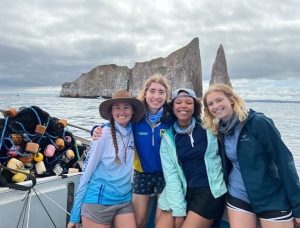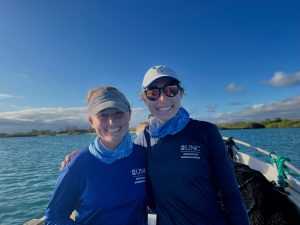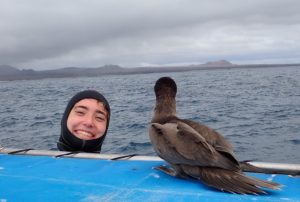As a high school senior in Japan in 2020, Emma Rudy Srebnik couldn’t visit any colleges due to the COVID-19 pandemic. In place of visiting the UNC campus, she arranged a virtual meeting with Professor John Bruno to discuss his research at UNC. Little did she know, a few summers later she would board a flight to the island of San Cristóbal, Galápagos to help support Bruno’s lab.
Emma Rudy was born in Hermosa Beach, CA but moved with her family to Yokohama, Japan in 2018. When COVID restrictions and long flights kept her from the US, where she knew she wanted to study, she decided to proactively reach out to a variety of professors across schools she considered applying to in order to help her make a final decision.
“I talked with John Bruno, who ended up being my PI mentor. I was really interested in his research, and he was enthusiastic about me coming to Chapel Hill,” said Emma Rudy.
Emma Rudy chose to pursue her college career at UNC and had to complete her first year online from Japan. In the spring of her first year, Emma Rudy applied to UNC’s field site, the Institute of Marine Science field site at Morehead City. After she was accepted through a process similar to study abroad, she got in touch with Dr. Matthew Godfrey, a sea turtle biologist at NC State University.

Emma Rudy’s sophomore year started at the Morehead City Campus. There, she assisted Dr. Godfrey in his research on the potential implications of relocating sea turtle nests. She also helped out UNC Professor Dr. Joel Fodrie in his lab studying seagrass, and completed a capstone project working with the U.S. National Park Service at Cape Lookout National Seashore.
“I loved the Morehead City field site. We had lots of hands-on experience in marine science, opportunities in ecology and in research. Eventually, I reached out to John Bruno again, and he offered me a spot in his lab on UNC’s campus,” said Emma Rudy.
In the spring of her sophomore year, Emma Rudy finally attended classes in Chapel Hill. She started working in the Bruno Lab, helping UNC PhD candidate Savannah Ryburn extract DNA from stomach contents of sharks caught in NC. Then, she asked Dr. Bruno to join his lab in the Galápagos for summer research. Upon his approval, Emma Rudy decided to apply for a SURF grant to fund her experience, which was approved.
Emma Rudy always knew she was interested in marine and environmental science, and was ecstatic to join the Galapagos research team, which meant being able to conduct research at the Galapagos Science Center (GSC). While at the GSC, Emma Rudy worked with one other undergraduate UNC student, two students from the University of San Francisco de Quito, and the other graduate students in Bruno’s lab.
“I spent the summer supporting different graduate students’ projects. For example, I helped Savannah Ryburn collect fecal samples from juvenile scalloped hammerhead sharks. We went out on a boat early in the morning to catch baby sharks. It was awesome,” said Emma Rudy.
Emma Rudy also had the opportunity to conduct field experiments underwater alongside UNC PhD candidate Esteban Agudo. She assisted him in his analysis of differences in trophic interactions with changes in temperature and other variables. “I have a strong background in scuba diving,” said Emma Rudy, “but I had never had the opportunity to use it to contribute to scientific research at the university level.”
With the lab, Emma Rudy was able to go to dive sites usually off-limits to tourists. “On a personal level, I felt grateful to be able to go to dive sites that I wouldn’t be allowed to as a tourist. I saw some incredible wildlife. I was able to challenge myself while doing science, and explore what it means to participate in scientific activities in other contexts,” said Emma Rudy.

Back on campus for the fall semester, Emma Rudy is now a Junior and is still working with the Bruno lab. “Right now, I am finishing up DNA extractions and running PCR on our samples from last year. We just finished extracting DNA from the final stomach contents of sharks caught off NC a few summers ago. We are looking to identify exactly what these sharks eat through analyzing the DNA samples,” said Emma Rudy.
Aside from the incredible opportunity for adventure, Emma Rudy says her experience this summer gave a well-rounded picture of what working in science looks like on a practical level.
“I feel like a lot of people use their summers to explore a new area of science, a different lab, or with different people. It was a neat opportunity to go and work with the same people from UNC, on projects that I still work on today. I can see these projects through all the way and stay involved in understanding what the results mean,” said Emma Rudy.
After specializing so deeply in one subject, Emma Rudy has decided to branch out to take full advantage of her Carolina experience. She is thinking of studying abroad next semester, Spring 2023.
“My UNC career has been weird. I have decided to embrace it and study abroad rather than try to recreate what could be a normal time at Chapel Hill. I have taken so many ecology classes here, and I don’t know what else is out there. I really enjoy learning. It would be neat to take classes that might not have initially attracted me as much as something in my wheelhouse.”
Emma Rudy is grateful for the experience, and encourages other UNC students to reach out to professors who are doing research in subjects they are interested in, or even to apply to study abroad.

“I still can’t believe that fecal swabbing sharks and scuba diving to conduct underwater experiments counted as my job this past summer. I really am so grateful that I had the opportunity to work in the Galápagos and learn from a community of scientists,” said Emma Rudy. “Whether fishing at 4am and seeing the entire net lit up with bioluminescence or spending 30 minutes captivated by a pod of orcas on our way back from scientific diving, I wouldn’t trade last summer for the world.”
Written by Molly Herring ’23, UNC Global Studies and Biology.
